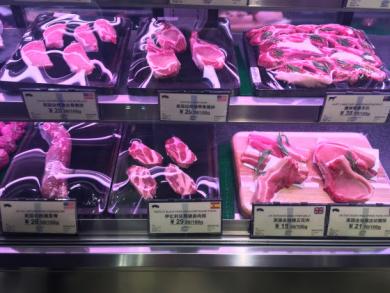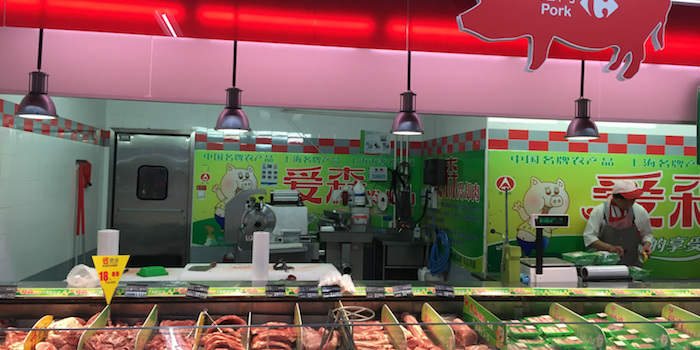Chinese consumers like the story behind British pork, according to the NPA’s Georgina Crayford, who has recently had a close-up glimpse of China’s retail pork sector.
Georgina has just returned from the latest leg of her Nuffield Scholarship, which included visits to Singapre, the Philippines and China, where she had the opportunity to visit a number of grocery outlets in Shanghai, including high-end supermarket City Super.
 “Their fresh meat counter housed a well-presented array of pork and beef from Australia, New Zealand, USA and UK, all clearly labelled with their country of orig a visit to the country as part of her Nuffield scholarship,” Georgina wrote on her Nuffield blog.
“Their fresh meat counter housed a well-presented array of pork and beef from Australia, New Zealand, USA and UK, all clearly labelled with their country of orig a visit to the country as part of her Nuffield scholarship,” Georgina wrote on her Nuffield blog.
“I was proud to find outdoor-bred British pork belly and chops in prime position and accompanied by an information poster explaining the conditions in which the pigs were raised,” she said.
It was ‘crystal clear’, she added, that imported food products are much more desirable to Chinese consumers than home-grown produce on the back of domestic food scandals and burgeoning interest in Western culture and brands.
“If you are a known brand, or have a good story to tell, then you will do well in China,” Georgina said, adding that it was striking how much prominence is given to pork in retail meat cabinets.
You can read more on the NPA website and on Georgina’s Nuffield blog, which can be viewed here and also covered the issue of brand theft in China.
She concluded: “It is well known that Chinese people have an affinity for all things British; post-Brexit this is something that we really need to unashamedly make the most of in China.
“But this also highlights the serious issue that is the copycat culture in China. You can never be sure that distributors in China won’t simply steal your logo, flag, brand or technology to market their own produce.
“It is absolutely essential, therefore, that businesses accessing the Chinese market police their own intellectual property in order to safeguard their brand and protect their market-share.”
China influence
China accounts for a more than quarter of all global pork imports and is now the UK’s biggest export destination by volume.
Last year, UK pork exports to China increased by 47% and were worth £74 million. However, EU pork exports to China fell by 18% in the first four months of 2017, figures from Eurostat show. April shipments, in particular, were reduced to a half of 2016 levels. China still accounted for nearly 40% of the total, however.
Despite some efforts to increase domestic production, one of the key messages from June’s Pigs 2022 conference in Solihull was that China, because of its appetite for imported product but also the costs associated with domestic production, will continue to import vast quantities of pigmeat in the years ahead.




